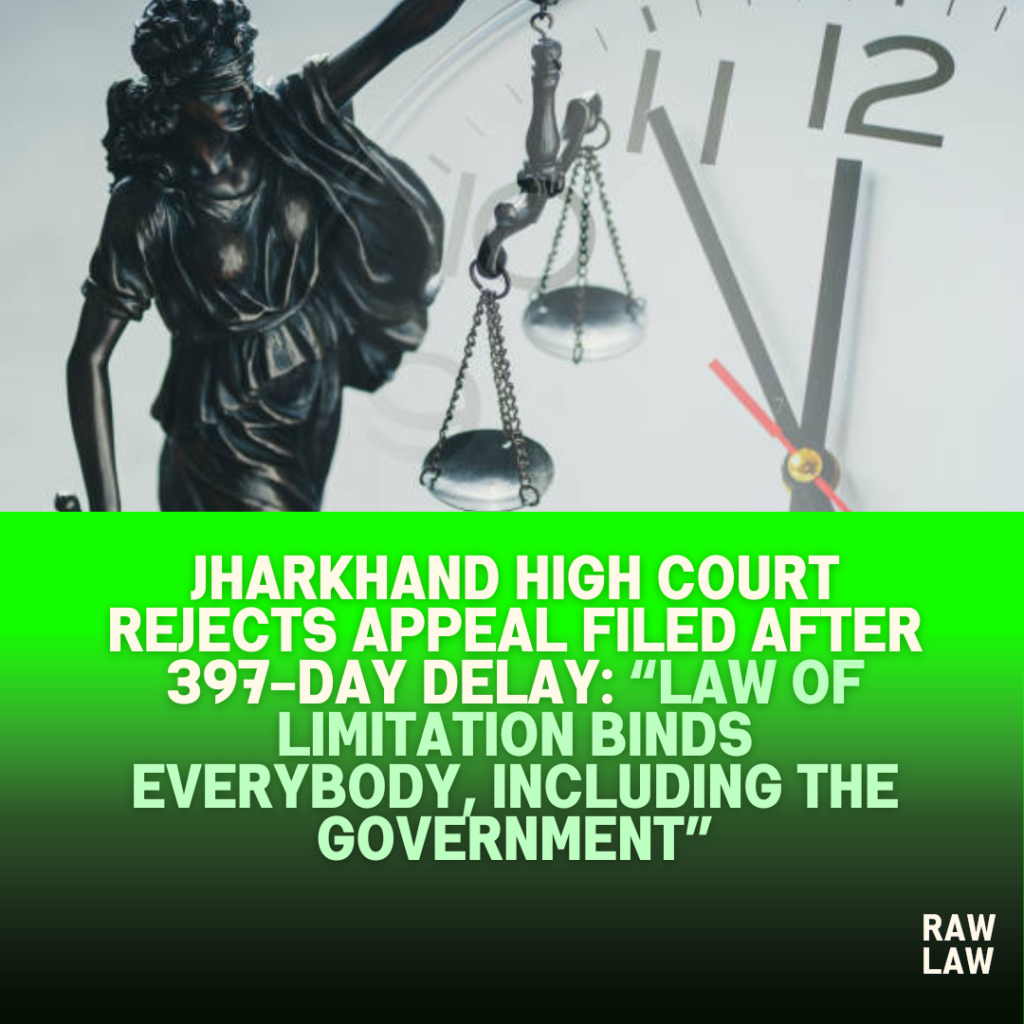Court’s Decision
In State of Jharkhand v. Chumnu Oraon & Ors., the Jharkhand High Court dismissed a Letters Patent Appeal (LPA) filed with a delay of 397 days against a judgment of the learned Single Judge in W.P.(S) No.3011 of 2020. The Court rejected the application for condonation of delay, finding no sufficient cause shown and noting the complete absence of urgency or diligence by the State. The appeal was consequently dismissed as time-barred.
Facts
The appeal arose from a judgment dated 21 August 2023, passed in a service matter involving the State and an employee. Instead of filing the appeal within the statutory 30-day limitation period, the State delayed filing the LPA by 397 days.
The explanation for delay, as presented in I.A. No.6083 of 2025, traced the file’s movement through multiple bureaucratic tiers—from the Deputy Director to the Advocate General—culminating in the appeal being filed only on 30 July 2024. Critically, the certified copy of the judgment was applied for only on 26 July 2024—almost a year after the judgment.
Issues
- Whether the State showed sufficient cause for condonation of a 397-day delay in filing the LPA?
- Whether procedural formalities and departmental movement of files can constitute “sufficient cause” under Section 5 of the Limitation Act?
- Whether the settled principles regarding government delay should be relaxed in this case?
Petitioner’s Arguments
The State argued:
- The delay was unintentional and caused due to procedural formalities and intra-departmental approvals.
- Grounds for appeal were prepared promptly upon direction of officials.
- The matter required clearance from multiple layers including the Advocate General, which consumed time.
- There was no deliberate delay or mala fide, and the State acted in good faith to protect public interest.
Respondent’s Arguments
The respondents countered:
- The explanation provided was vague and perfunctory.
- No justification was offered for not even applying for the certified copy of the judgment for nearly a year.
- Government departments cannot use bureaucratic delay as a shield against limitation.
- The lethargy displayed showed a complete lack of due diligence.
Analysis of the Law
The Court scrutinized the chronology of events:
- Judgment was delivered on 21 August 2023.
- Application for certified copy was made on 26 July 2024, nearly 11 months later.
- Filing of the LPA occurred on 30 July 2024.
The High Court held that there was no justification whatsoever for the delay in applying for the certified copy or in instituting the appeal.
Precedent Analysis
The Court relied heavily on the Supreme Court’s decision in:
- Postmaster General v. Living Media India Ltd., (2012) 3 SCC 563:
The apex court cautioned against mechanically condoning delays merely because the applicant is a government department. It held:
“The law of limitation binds everybody, including the Government… the claim on account of impersonal machinery and inherited bureaucratic methodology… cannot be accepted in view of the modern technologies being used and available.”
The High Court found this decision squarely applicable, especially since the government had not even applied for the certified copy in time.
Court’s Reasoning
The Division Bench comprising Chief Justice M.S. Ramachandra Rao and Justice Rajesh Shankar held:
- The State was well aware of the limitation period yet exhibited no urgency.
- Procedural movement of files and absence of explanation for non-application of the certified copy was fatal.
- Despite having “competent persons familiar with court proceedings,” the State showed “no diligence in prosecuting the matter.”
- Delay could not be condoned mechanically or out of sympathy.
Conclusion
- The application for condonation of delay (I.A. No.6083 of 2025) was dismissed.
- Consequently, the Letters Patent Appeal was also dismissed as barred by limitation.
Implications
This ruling:
- Reaffirms that government departments are not entitled to special treatment in limitation matters.
- Emphasizes accountability and due diligence in legal proceedings by State authorities.
- Serves as a stern reminder that systemic lethargy cannot override statutory timelines.
Cases Referred and Their Relevance
Postmaster General v. Living Media India Ltd., (2012) 3 SCC 563
➤ Applied directly. The Supreme Court declined to condone delay due to government lethargy, holding law of limitation applies equally to all.



